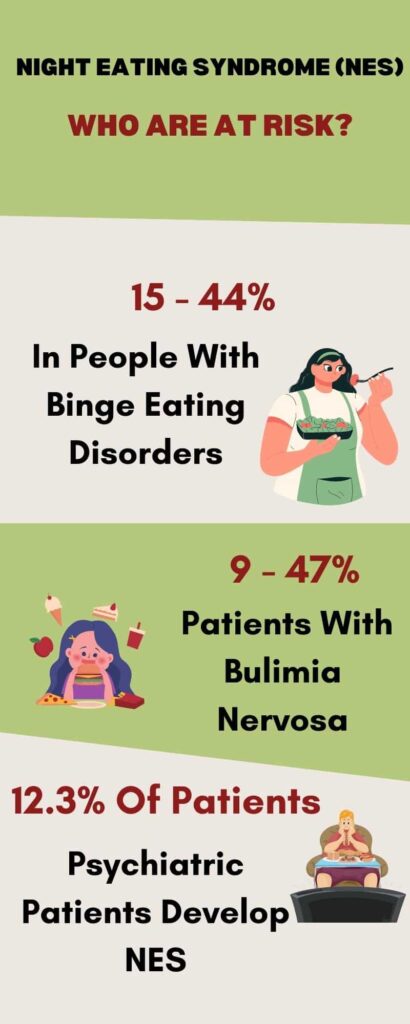Fight Against Night Eating Syndrome (NES): Simple Tips
Night Eating Syndrome (NES) is an eating disorder that interrupts sleep and urges you to wake up at night to eat or overeat. You may feel like you cannot sleep until you eat something.
NES may also lead to anxiety and stress if it continues for a long time. If diagnosed in the early stages, Night Eating Syndrome can be treated naturally by focussing on food intake and good sleep habits.
This article covers all the causes and symptoms of NES and some natural and therapeutic treatment measures to get you back on track to a healthy life.
What Is Night Eating Syndrome(NES)?
Night Eating Syndrome(NES) is a sleep-related eating syndrome characterized by the clinical behaviors associated with morning anorexia, evening hyperphagia, and insomnia.
People suffering from NES might face a delay in their circadian pattern of food intake, but their sleep-wake cycle is hardly affected by it.
Albert Stunkard, a psychiatrist from the University of Pennsylvania, identified NES in 1950. NES is listed as Other Specified Feeding or Eating Disorder (OSFED) of DSM-5 (Diagnostic and Statistical Manual of Mental Disorders).
If you have NES, you will have a strong urge to eat between dinner and sleep, which might affect your morning appetite.
Is Night Eating Syndrome(NES) common?
Night Eating Syndrome is common among patients having other eating disorders. Research and studies have concluded that 1.5% of the US population is affected by NES.
It is commonly observed in patients with diabetes and obesity. People suffering from mental illnesses including depression, anxiety, and insomnia have higher chances of getting affected by NES.

Night Eating Syndrome(NES): Causes and Symptoms
Causes of NES
The causes of NES are usually associated with biological, social, and psychological factors. Some of the most common causes of NES include
- Depression, Anxiety, and stress.
- Hyperphagia, caused by an injury in Hypothalamus, may increase appetite or food consumption.
- Genetic reason – A defect in gene PER1, which controls the body clock, may lead to NES.
- Dieting could also be a reason. When there is a reduction in food intake during the day, you might get into the habit of eating at night.
- Hormonal imbalances can also interrupt eating practices and may cause NES.
Symptoms of NES
The possible symptoms of NES include:
- Waking up during the night to eat
- Consuming at least 25% of food in the evening after dinner
- Skipping breakfast due to a lack of interest in eating
- Food cravings after dinner or during nighttime
- Feeling depressed at night
- Believing you can sleep only after eating at the night
- Experiencing Insomnia for about three to five days a week
- Depressed mood in the late evening hours
- Recall of night eating
- Feeling hungry after eating dinner before sleep
- Overeating until comfortably full
- Feeling upset or guilty while eating
If you experience any of the above mentioned symptoms, it is time to visit your doctor and take necessary measures to regain your health.
Night Eating Syndrome(NES) Treatment: Simple Steps To Cure
Night eating syndrome treatment may include therapies and medications. It is treatable, and most people respond to simple behavioral changes:
- Monitoring meal intake throughout the day
- Planning meal intake and avoiding skipping meals
- Switching to a relaxing nighttime routine
- Limiting light exposure at night and increasing bright light exposure in the morning
- Avoiding eating in the bedrooms
- Being active throughout the day
- Implementing Relaxation techniques
Suggested Therapies For NES
- Cognitive Behavioral Therapy(CBT) – CBT is a structured treatment considered the most effective treatment for NES. CBT aims to introduce behavioral changes such as regular eating and reducing the frequency of snacking at night. Research has shown that patients are most likely to succeed at the treatment's end.
- Cognitive Remediation Therapy(CRT) – CRT teaches thinking skills to the patients. It helps improve social, emotional, and cognitive functions for better life management. This is accomplished mainly by mental exercises.
- Acceptance and Commitment Therapy(ACT) – ACT therapy helps patients accept their feelings and thoughts, move towards something they value, and take action on the chosen value. ACT brings a meaningful behavioral change among the patients over time.
- Dialectical Behavior Therapy(DBT) – DBT helps individuals to make decisions on emotional and rational input and reduce judgemental thoughts. It helps with coping with crises and identifying different emotions. It also helps to develop effective interpersonal skills.
- Exposure Therapy – Exposure therapy helps patients face difficult situations and come out of their fear. This therapy builds confidence among them and helps them manage their anxiety. It also increases their tolerance level for handling adverse situations.
- Group Therapy – Group therapy is a form of talk therapy and involves forming a group with similar problems under a therapist. It encourages them to stay committed to their recovery and helps them boost their confidence.
- Family Therapy – Family therapy involves the family of the patient, which helps them communicate and improve their interpersonal skills. Family therapy lets patients quickly identify their strengths and weaknesses and overcome unhelpful situations.
- Interpersonal Therapy – Interpersonal therapy helps individuals accept and recover from a change in the relationship when they face situations such as divorce, retirement, death of a loved one, or becoming a parent. This therapy encourages them to meet and handle situations during the relationship transition.
- Photo Therapy – Phototherapy exposes the person to bright light and regulates their circadian rhythm, which helps them to eat and sleep at the right time. Disturbance in the circadian rhythm is considered the most common reason for night eating.
Night Eating Syndrome(NES) Vs. Binge Eating Disorder(BED)
Many of them think that Night Eating Syndrome (NES) and Binge Eating Disorder (BED) are the same. But they are not. Here, we have come up with some differences that would help you distinguish their characteristics and effect on your body.
| | |
|---|---|
| The core criteria of BED are multiple episodes of over-eating | The core criteria of NES is the delayed circadian shift of eating |
| BED involves consuming large quantities of food very rapidly | NES involves consuming food in the late evenings after dinner or in between sleep |
| People with BED consume excess food even if they are not hungry | People with NES eat after dinner without a cause or appetite which causes a low appetite in the morning and skip breakfast. |
| Food consumption is uncontrollable, and they feel a sense of shame or guilt | People with NES might consume ample food and take additional calories but they do not feel shame or guilt. |
| Binge eating is not associated with sleep. You consume food uncontrollably when you eat. | People wake up several times at night. Results in fewer sleeping hours |
Do Night Eating Syndrome (NES) have any health issues?
Individuals with NES are often obese, which puts them at risk of
- Obesity
- Stress
- Anxiety
- Depression
- Diabetes
- High blood pressure
- High cholesterol
- Cardiovascular issues
- Gastrointestinal issues
Hacks That Help People With Night Eating Syndrome
- As a first step, you must identify the cause of late-night eating. There could be multiple reasons, such as anxiety, missing proper meals, etc.
- Follow a proper food routine. If you skip breakfast or lunch, your calorie insufficiency will prompt you to take snacks late at night.
- Avoid unhealthy snacks which might tempt you to munch them. Ingesting healthy snacks, fruits, and salads will not cause any problems.
- A protein-enriched meal keeps you fuller for a longer time and reduces night eating.
- Have healthy snacks at night, which help in digestion and does not add any extra calories.
- Reduce your stress and depression by trying relaxation exercises like meditation, yoga, etc
- Brush your teeth after dinner, which will lower the desire to eat at night.
- Keep yourself preoccupied, so you do not have time to think of food. Some people snack or overeat if they are bored.
Can We Prevent Night Eating Syndrome?
Yes, certain behavioral changes will help you prevent night-eating disorder. Though several factors are diagnosed for the cause, we can still follow a few lifestyles which could prevent NES.
- Stress, anxiety, and depression disturb your food and sleep patterns. Take care of your mind first.
- Keep an alert on what you eat and when you eat. Combat any erratic changes in your eating habits. Follow a regular food chart that keeps your eating habits in check.
- Regular fitness will help you to eat and sleep better. So exercise regularly.
- Avoid consumption of caffeine, alcohol, and tobacco at bedtime.
- Avoid watching TV late at night which might intend you to have snacks
- Practice good sleep habits
- Plan your meals and snacks and keep hunger at bay.
Bottomline
Night Eating might feel joyful initially but, if untreated, might harm your health in the long run and can even lead to threatening consequences. So, it is better to visit your doctor and take necessary therapy methods to fight your Night Eating Syndrome (NES).
NES is treatable, and most patients can recover by taking steps to change their behavior and lifestyle.








